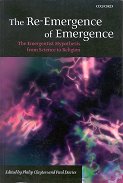This collection of essays offers the first systematic presentation of what emergence means across the natural and social sciences and in the sphere of religion. Experts lay out the distinctive features of emergence in their respective fields—in quantum physics and astronomy, in cell biology and primatology. Building on this background, leading philosophers of mind then debate the perplexing question of whether, and if so how, consciousness emerges from the functioning of the brain. Again drawing on the results of earlier chapters, theologians and philosophers of religion speculate on how the sphere of religion might be reconceived in light of the emergentist paradigm. Are there significant parallels between instances of emergent complexity in different sorts of natural systems? Is it acceptable to speak of new, emergent forms of casuality? Does emergence further complicate the relation between science and religion, or does it hold a key to overcoming some of the deep tensions between them that have characterized the modern age?
The Re-Emergence of Emergence contains the work both of leading proponents of emergence theory as well as of its most outspoken critics. It provides the clearest presentation yet of this exciting new theory of science—and of its potential pitfalls. It is both an invaluable introduction to the field and a contribution to the ongoing scholarly debate.
